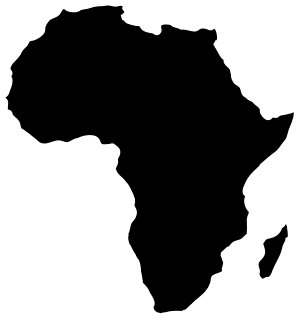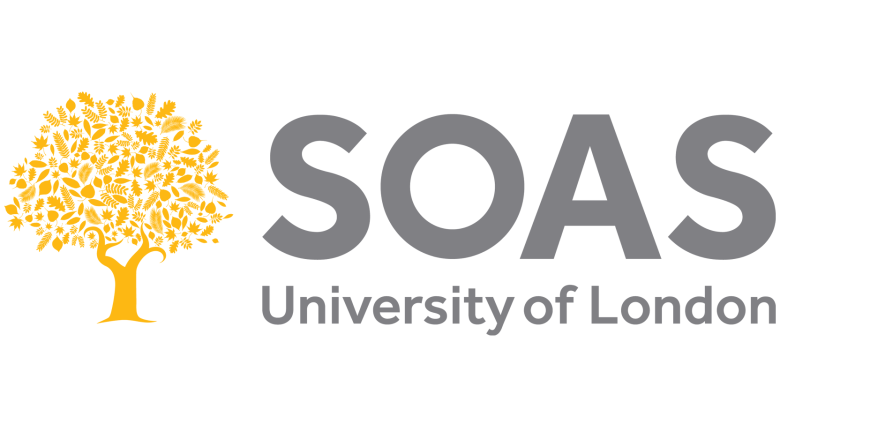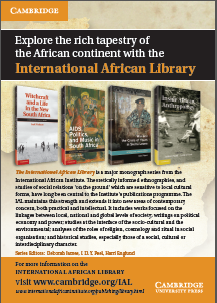The International African Library
Call for proposals
The International African Institute (IAI) and Cambridge University Press (CUP) welcome proposals for the International African Library monograph series.
The series editors are Leslie Bank (Human Science Research Council, Pretoria, South Africa), Harri Englund (Cambridge, UK), Deborah James (LSE, UK), Helene Neveu Kringelbach (University College London), Adeline Masquelier (Tulane, New Orleans US) and David Pratten, University of Oxford.
The managing editor is Stephanie Kitchen, International African Institute. The editors welcome proposals from scholars in fields including social anthropology, development, history and politics that privilege an ethnographic approach. We are looking for theoretically informed ethnographies, and studies of social relations 'on the ground', sensitive to local cultural forms. The series includes works focused on the linkages between local, national and global levels of society; writing on political economy and power; studies at the interface of the socio-‐cultural and the environmental; analyses of the roles of religion, cosmology and ritual in social organisation; and historical studies of a social, cultural or interdisciplinary nature.
The International African Institute, London, is a learned society and publisher of the journal Africa since 1928. Cambridge University Press is a leading scholarly publisher of African studies journals and monographs.
Please send any initial enquiries to:
Stephanie Kitchen, managing editor, International African Institute, sk111@soas.ac.uk
The International African Library is a major monograph series from the International African Institute. Theoretically informed ethnographies, and studies of social relations 'on the ground' which are sensitive to local cultural forms, have long been central to the Institute's publications programme. The IAL maintains this strength and extends it into new areas of contemporary concern, both practical and intellectual. It includes works focused on the linkages between local, national and global levels of society; writings on political economy and power; studies at the interface of the socio-cultural and the environmental; analyses of the roles of religion, cosmology and ritual in social organisation; and historical studies, especially those of a social, cultural or interdisciplinary character.
Series editors
Leslie Bank, Fort Hare Institute of Social and Economic Research, South Africa
Harri Englund, University of Cambridge
Deborah James, London School of Economics and Political Science
Helene Neveu Kringelbach, University College London
Adeline Masquelier, Tulane University, Louisiana
David Pratten, University of Oxford
Submissions
Suitable proposals for new books in the series are welcomed by the series editors and Institute. A proposal should include sections on at least the following: rationale for the monograph, contribution of the monograph, note on readership/audience (to be as specific as possible, including examples of courses on which it may be used); draft table of contents, chapter outlines, ideally a sample chapter to give the series editors a sense of your ethnographic research and writing; statement about how you see the book as fitting into this series in particular; note on length (our usual guideline is for monographs to be 90-120,000 words inclusive of notes and references), and time scale for full manuscript submission.
Proposals can be sent to Stephanie Kitchen, managing editor, sk111(AT)soas.ac.uk. For further information, editorial queries or more detailed submission guidelines, please also contact sk111(AT)soas.ac.uk
Publishing information
From volume 41 (2011), the series is published by Cambridge University Press. Volumes 7-40 in the series are available from Edinburgh University Press. A list of international distributors for these volumes is available here.
 Youth, Pentecostalism, and Popular Music in Rwanda
Youth, Pentecostalism, and Popular Music in Rwanda
Andrea Mariko Grant
Youth, Pentecostalism, and Popular Music in Rwanda offers fascinating insight into the lived experiences of young people in Rwanda through ethnographic analysis of the ambiguities and ambivalences that have accompanied the country's rapid post-genocide development. Andrea Mariko Grant considers how Pentecostalism and popular music offer urban young people ways to craft themselves and their futures; to imagine alternative ways to 'be' Rwandan and inhabit the city in the post-genocide era. Exploring the idiom of the heart – and efforts to transform it – this book offers a richly nuanced perspective of urban young people's everyday lives, their aspirations and disappointments, at a political moment of both great promise and great constraint. Rather than insist on a resistance-dominance binary, Grant foregrounds the possibilities of agency available to young people, their ability to make 'noise', even when it may lead to devastating consequences.
Published for the IAI by Cambridge University Press
ISBN 9781009262712, October 2024
 Bus Station Hustle
Bus Station Hustle
Michael Stasik
Bus stations are among the most prominent sites of social and economic activity in Africa. Integral to transport, trade, and exchange over distance, they provide livelihoods for large numbers of people. Through a detailed ethnography of one of Ghana's busiest long-distance bus stations, Michael Stasik explores the dialectical relationship between the ways in which people make the station work and how the station shapes popular economic engagement and social life. Drawing on a dual understanding of 'hustle' as a distinct mode of economic activity and organisation, as well as a marker of complex and sometimes bewildering situations, Stasik challenges dominant views of transport work in urban Africa, especially those wedded to generic notions of 'informality'. Bus Station Hustle offers a nuanced anthropological perspective on the hands-on work in and the institutional workings of an infrastructural hub of mobility and exchange. This title is also available as Open Access on Cambridge Core.
Published for the IAI by Cambridge University Press
ISBN 9781009486651, August 2024
 Love and Violence in Sierra Leone: Mediating Intimacy after Conflict
Love and Violence in Sierra Leone: Mediating Intimacy after Conflict
Luisa T. Schneider
In the decades following the civil war that took place in Sierra Leone between 1991 and 2002, new laws were passed to rebuild the state, and to prevent rape, teenage pregnancy and domestic violence. In this ethnography, Luisa T. Schneider explores the intricate semantic, empirical and socio-legal dynamics of love and violence in post-conflict Sierra Leone, challenging the oversimplification of these phenomena. Schneider underscores the limitations of imposing singular interpretations on love and violence, advocating for a nuanced, phenomenological approach that reveals how state and institutional attempts to regulate violence and loving relationships without considering local lived experience and meaning-making can yield negative consequences. By analysing how love and violence are historically constituted, experienced, and (re)produced across personal, social, legal, and political levels, this book critiques the construction of violence within gendered sexual relationships by development agencies, law makers and politicians, urging them to engage with local knowledge and experience. This title is also available as Open Access on Cambridge Core.
Published for the IAI by Cambridge University Press
ISBN 9781009532990, August 2024
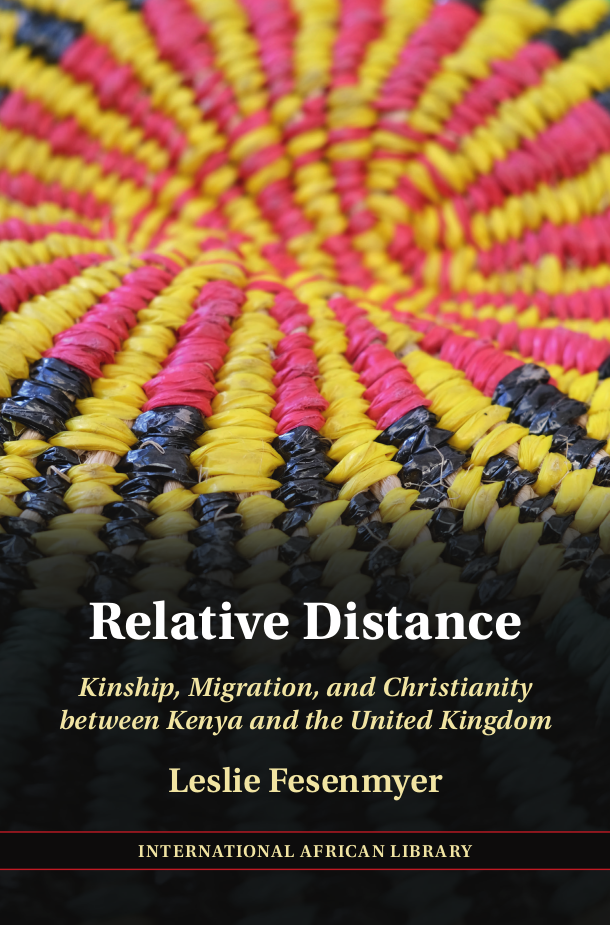 Relative Distance: Kinship, Migration, and Christianity between Kenya and the United Kingdom
Relative Distance: Kinship, Migration, and Christianity between Kenya and the United Kingdom
Leslie Fesenmyer
The socio-economic and political uncertainties of Kenya in the 1990s jeopardized what many saw as the
promises of modernity. An increasing number of Kenyans migrated, many to Britain, a country that felt
familiar from Kenyan history. Based on extensive fieldwork in Kenya and the United Kingdom, Leslie
Fesenmyer provides a rich, historically-nuanced study of the kinship dilemmas that underlie
transnational migration and explores the dynamic relationship between those who migrate and those who
stay behind. Challenging a focus on changing modes of economic production, 'push-pull' factors, and
globalization as drivers of familial change, she analyses everyday transnational family life. Relative
Distance shows how quotidian interactions, exchanges, and practices transform kinship on a local and
global scale. Through the prism of intergenerational care, Fesenmyer reveals that the question of who is
responsible for whom, is not only a familial matter, but is at the heart of relations between
individuals, societies, and states.
Published for the IAI by Cambridge University Press
ISBN 9781009335096, June 2023
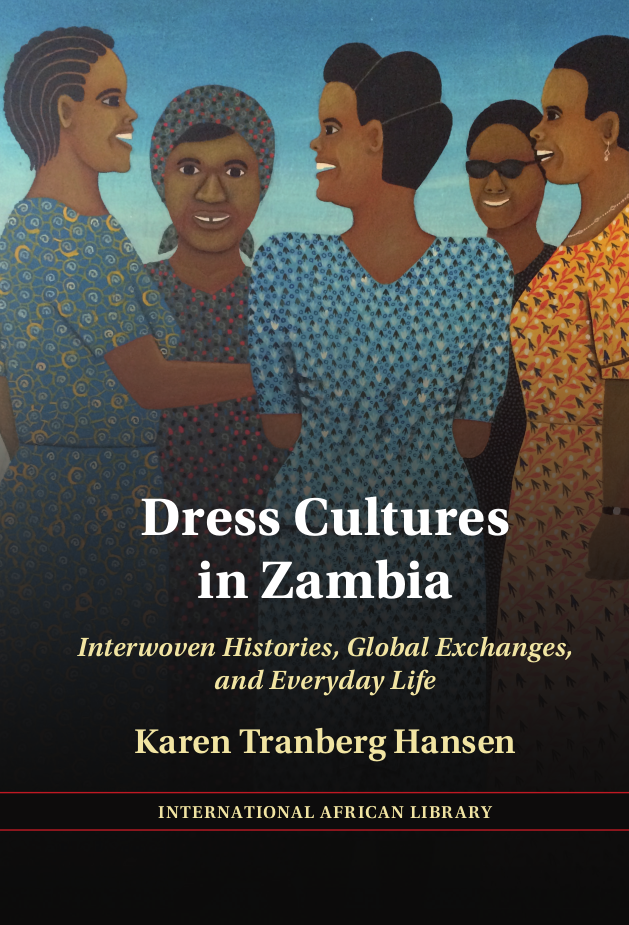 Dress Cultures in Zambia:
Interwoven Histories, Global Exchanges, and Everyday Life
Dress Cultures in Zambia:
Interwoven Histories, Global Exchanges, and Everyday Life
Karen Tranberg Hansen
Drawing on half-a-century of research in Zambia and regional scholarship, Karen Tranberg Hansen offers a
vibrant history of changing dress practices from the late-colonial period to the present day. Exploring
how the dressed body serves as the point of contact between personal, local, and global experiences, she
argues that dress is just as central to political power as it is to personal style. Questioning the idea
that the West led fashion trends elsewhere, Hansen demonstrates how local dress conventions appropriated
western dress influences as Zambian and shows how Zambia contributed to global fashions, such as the
colourful Chitenge fabric that spread across colonial trading networks. Brought to life with colour
illustrations and personal anecdotes, this book spotlights dress not only as an important medium through
which Zambian identities are negotiated, but also as a key reflector and driver of history.
Published for the IAI by Cambridge University Press
ISBN 9781009350310, June 2023
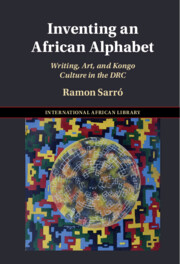 Inventing an African Alphabet: Writing, Art, and Kongo Culture in the DRC
Inventing an African Alphabet: Writing, Art, and Kongo Culture in the DRC
Ramon Sarró
In 1978, Congolese inventor David Wabeladio Payi (1958–2013) proposed a new writing system, called
Mandombe. Since then, Mandombe has grown and now has thousands of learners in not only the Democratic
Republic of Congo, but also France, Angola and many other countries. Drawing upon Ramon Sarró's personal
friendship with Wabeladio, this book tells the story of Wabeladio, his alphabet and the creativity that
both continue to inspire. A member of the Kimbanguist church, which began as an anticolonial movement in
1921, Wabeladio and his script were deeply influenced by spirituality and Kongo culture. Combining
biography, art, and religion, Sarró explores a range of ideas, from the role of pilgrimage and landscape
in Wabeladio's life, to the intricacies and logic of Mandombe. Sarró situates the creative individual
within a rich context of anthropological, historical and philosophical scholarship, offering a new
perspective on the relationships between imagination, innovation and revelation.
Published for the IAI by Cambridge University Press
ISBN 9781009199476, February 2023
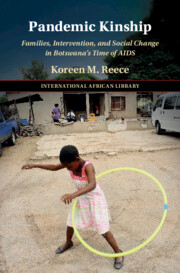 Pandemic Kinship: Families, Intervention, and Social Change in Botswana's Time of AIDS
Pandemic Kinship: Families, Intervention, and Social Change in Botswana's Time of AIDS
Koreen M. Reece
Shaped around the stories of one extended family, their friends, neighbours, and community, Pandemic
Kinship provides an intimate portrait of everyday life in Botswana's time of AIDS. It challenges
assumptions about a 'crisis of care' unfolding in the wake of the pandemic, showing that care - like
other aspects of Tswana kinship - is routinely in crisis, and that the creative ways families navigate
such crises make them kin. In Setswana, conflict and crisis are glossed as dikgang, and negotiating
dikgang is an ethical practice that generates and reorients kin relations over time. Governmental and
non-governmental organisations often misread the creativity of crisis, intervening in ways that may
prove more harmful than the problems they set out to solve. Moving between family discussions, community
events, and the daily work of orphan care projects and social work offices, Pandemic Kinship provides
provocative insights into how we manage change in pandemic times.
Published for the IAI by Cambridge University Press
ISBN 9781009193474, October 2022
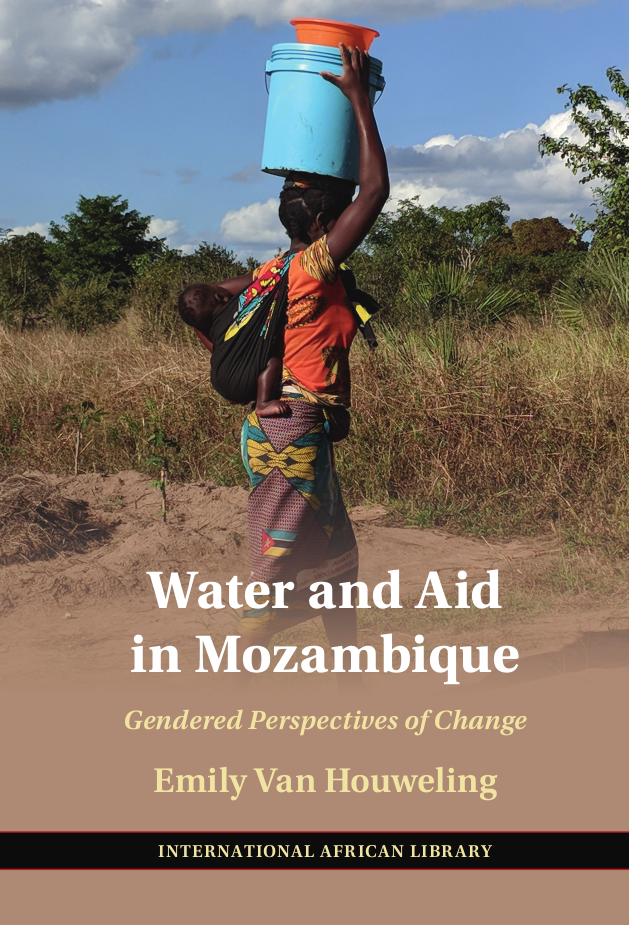 Water and Aid in Mozambique: Gendered Perspectives of Change
Water and Aid in Mozambique: Gendered Perspectives of Change
Emily Van Houweling
Analysing how water development projects unfolded in five rural communities in Mozambique, Emily Van
Houweling offers an alternative perspective on water and the politicised nature of water management in
the region. Using a hydro-social cycle framework, she demonstrates how water is tied to everyday life in
matrilineal Nampula and how social relations, gender roles, and local politics were reconfigured during
the project. While centring the experience of community members, Van Houweling also includes the
perspectives of project implementers, showing how project plans were translated and negotiated as they
worked their way down to the community. Employing the concept of organisational culture, Van Houweling
reveals the tensions that resulted from different actors' decision-making processes and motivations, and
illuminates possible explanations for the gaps between policy and practice. Exploring women's
empowerment, community ownership, and participation, this book facilitates innovative ways for thinking
about evaluation, sustainability, and gender-water relations.
Published for the IAI by Cambridge University Press
ISBN 9781009150200, May 2022
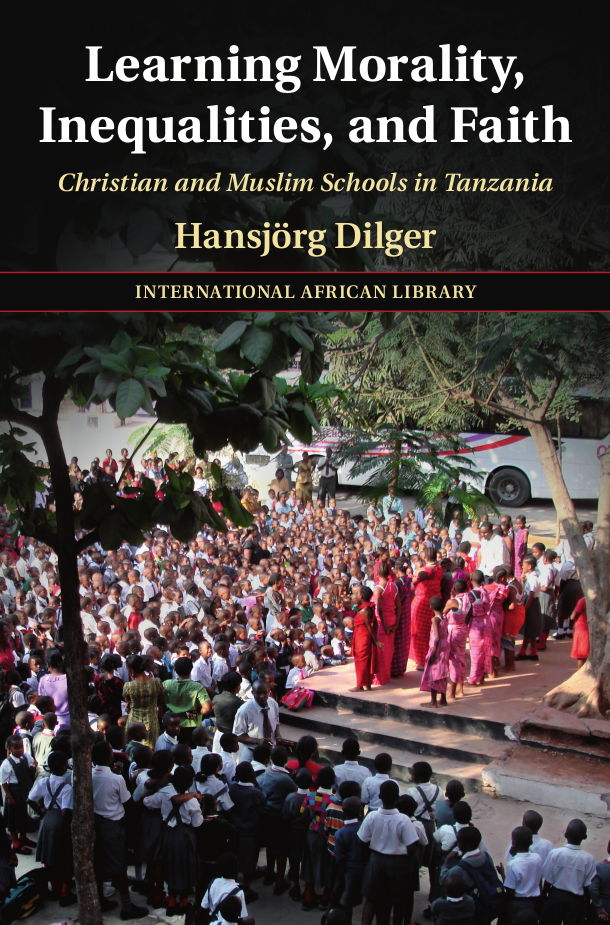 Learning Morality, Inequalities, and Faith: Christian and Muslim Schools in Tanzania
Learning Morality, Inequalities, and Faith: Christian and Muslim Schools in Tanzania
Hansjörg Dilger
Christian and Muslim schools have become important target points in families and pupils' quests for new
study opportunities and securing a 'good life' in Tanzania. These schools combine secular education with
the moral (self-)formation of young people, triggering new realignments of the fields of education with
interreligious co-existence and class formation in the country's urban centres. Hansjörg Dilger explores
the emerging entanglements of faith, morality, and the educational market in Dar es Salaam, thereby
shedding light on processes of religious institutionalisation and their individual and collective
embodiment. By contextualising these dynamics through analysis of the politics of Christian-Muslim
relations in postcolonial Tanzania, this book shows how the field of education has shaped the positions
of these highly diverse religious communities in diverging ways. In doing so, Dilger suggests that
students and teachers' religious experience and practice in faith-oriented schools are shaped by the
search for socio-moral belonging as well as by the power relations and inequalities of an interconnected
world.
Published for the IAI by Cambridge University Press
ISBN 9781316514221, 242pp, March 2022
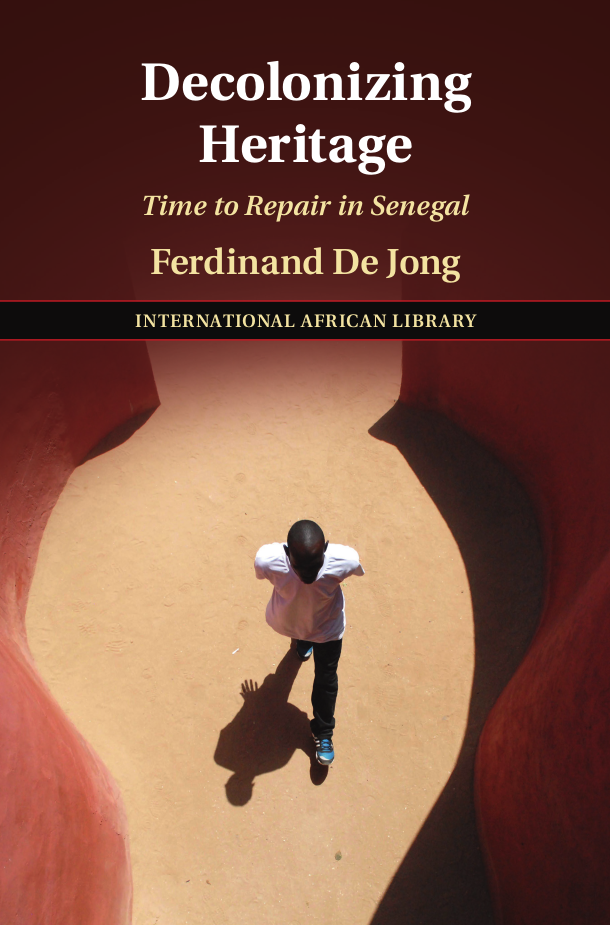 Decolonizing Heritage: Time to Repair in Senegal
Decolonizing Heritage: Time to Repair in Senegal
Ferdinand De Jong
Senegal features prominently on the UNESCO World Heritage List. As many of its cultural heritage sites
are remnants of the French empire, how does an independent nation care for the heritage of colonialism?
How does it re-interpret slave barracks, colonial museums, and monuments to empire to imagine its own
national future? This book examines Senegal's decolonisation of its cultural heritage. Revealing how
Léopold Sédar Senghor's philosophy of Négritude inflects the interpretation of its colonial heritage,
Ferdinand De Jong demonstrates how Senegal's reinterpretation of heritage sites allows it to overcome
the legacies of the slave trade, colonialism and empire. Remembering and reclaiming a Pan-African
future, De Jong shows how World Heritage sites are conceived as the archive of an Afrotopia to come,
and, in a move towards decolonisation, how they re-appropriate time to repair the wounds of colonialism.
Published for the IAI by Cambridge University Press
ISBN 9781316514535, 242pp, February 2022
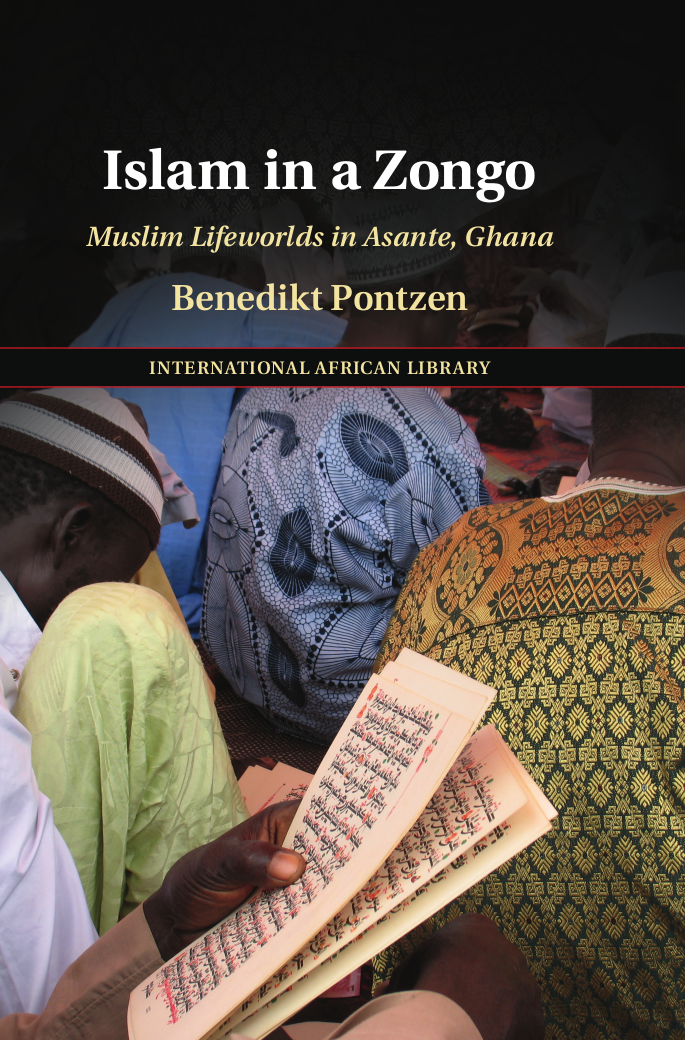 Islam in a Zongo: Muslim Lifeworlds in Asante, Ghana
Islam in a Zongo: Muslim Lifeworlds in Asante, Ghana
Benedikt Pontzen
Zongos, wards in West Africa populated by traders and migrants from the northern savannahs and the
Sahel, are a common sight in Ghana's Asante region where the people of these wards represent a
dual-minority as both foreigners and Muslims in a largely Christian area, facing marginalisation as a
result. Islam provides the people of the zongos with a common ground and shared values, becoming central
to their identity and to their shared sense of community. This detailed account of Islamic lifeworlds
highlights the irreducible diversity and complexity of 'everyday' lived religion among Muslims in a
zongo community. Benedikt Pontzen traces the history of Muslim presence in the region and analyses three
Islamic phenomena encountered in its zongos in detail: Islamic prayer practices, the authorisation of
Islamic knowledge, and ardently contested divination and healing practices. Drawing on empirical and
archival research, oral histories, and academic studies, he demonstrates how Islam is inextricably bound
up with the diverse ways in which Muslims live it.
Published for the IAI by Cambridge University Press
ISBN 9781108830249, 266pp, January 2021
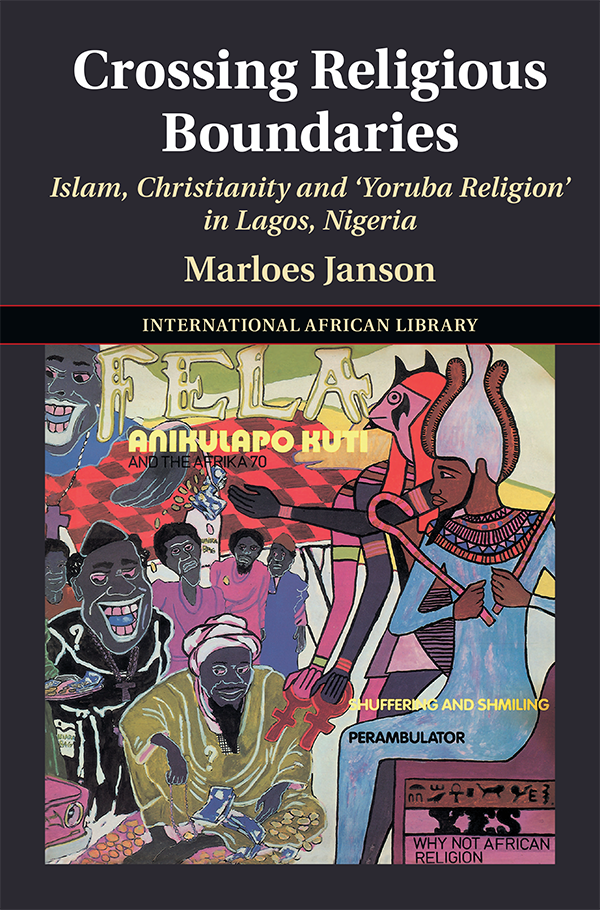 Crossing Religious Boundaries: Islam, Christianity and
‘Yoruba Religion' in Lagos, Nigeria
Crossing Religious Boundaries: Islam, Christianity and
‘Yoruba Religion' in Lagos, Nigeria
Marloes Janson
Religious pluralism, as encountered in multi-faith settings such as Nigeria's biggest city Lagos,
challenges much of what we have long taken for granted about religion, including the ready-made binaries
of Christianity versus Islam, religion versus secularism, religious monism versus polytheism, and
tradition versus modernity. In this book, Marloes Janson offers a rich ethnography of religions,
religious pluralism and practice in Lagos, analysing how so-called 'religious shoppers' cross religious
boundaries, and the coexistence of different religious traditions where practitioners engage with these
simultaneously. Prompted to develop a broader conception of religion that shifts from a narrow analysis
of religious traditions as mutually exclusive, Janson instead offers a perspective that focuses on the
complex dynamics of their actual entanglements. Including real-life examples to illustrate religion in
Lagos through religious practice and lived experiences, this study takes account of the ambivalence,
inconsistency and unpredictability of lived religion, proposing assemblage as an analytical frame for
exploring the conceptual and methodological possibilities that may open as a result.
Published for the IAI by Cambridge University Press
ISBN: 9781108838917, 242 pp, June 2021
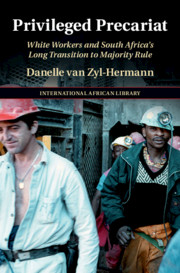 Privileged Precariat: White Workers and South
Africa's Long Transition to Majority Rule
Privileged Precariat: White Workers and South
Africa's Long Transition to Majority Rule
Danelle van Zyl-Hermann
White workers occupied a unique social position in apartheid-era South Africa. Shielded from black
labour competition in exchange for support for the white minority regime, their race-based status
effectively concealed their class-based vulnerability. Centred on this entanglement of race and class,
Privileged Precariat examines how South Africa's white workers experienced the dismantling of the racial
state and the establishment of black majority rule. Starting from the 1970s, it shows how apartheid
reforms constituted the withdrawal of state support for working-class whiteness, sending workers in
search of new ways to safeguard their interests in a rapidly changing world. Danelle van Zyl-Hermann
tracks the shifting strategies of the blue-collar Mineworkers' Union, culminating in its reinvention, by
the 2010s, as the Solidarity Movement, a social movement appealing to cultural nationalism. Integrating
unique historical and ethnographic evidence with global debates, Privileged Precariat offers a
chronological and interpretative rethinking of South Africa's recent past and contributes new insights
from the Global South to debates on race and class in the era of neoliberalism.
Published for the IAI by Cambridge University Press
ISBN 9781108831802, 338pp, March 2021
 Hunting Game: Raiding Politics in the Central African Republic
Hunting Game: Raiding Politics in the Central African Republic
Louisa Lombard
Northeastern Central African Republic - a vast space bordering Chad, Darfur, and South Sudan - is a
quintessential 'stateless' space, where the government has little presence and armed actors operate
freely. In this first ethnographic and historical study of Central African raiding, Louisa Lombard
investigates practices of forceful acquisition, a distinctive political repertoire in which claims to
social status are linked to the ability to take (from wild spaces, or from others) and are frequently
overturned. People have developed raiding skills to survive and live in a stateless borderland for over
150 years. From the trans-Saharan slave trade, to colonial forced labour regimes, big game hunting and
coercive conservation, to rebellion, raiding has flourished where people's status in relation to each
other is unclear and where institutional guidance is absent. Hunting Game offers rich comparative
insights into the vibrant, if not always salutary, role that forceful acquisition plays in the world
today.
Published for the IAI by Cambridge University Press
ISBN 9781108478779, 253pp, February 2020
 Race for Education: Gender, White Tone and Schooling in South Africa
Race for Education: Gender, White Tone and Schooling in South Africa
Mark Hunter
When apartheid ended in 1994, the ANC government placed education at the centre of its plans to
build a nonracial and more equitable society. Yet by the 2010s a wave of student protests—beginning
with the #RhodesmustFall movement—voiced powerful demands for decolonised and affordable education.
Drawing on ethnography, archival research, and more than 500 interviews, Race for Education follows
families and schools in Durban over nearly a decade. Shedding new light on South Africa’s political
transition and the global phenomenon of education marketisation, the book rejects simple
descriptions of the country’s move from “race to class apartheid.” It reveals how “white” phenotypic
traits like skin colour retain value in the schooling system even as the multiracial middle class
embraces prestigious linguistic and embodied practices the book calls “white tone.” But the story is
also one of family love and sacrifice: white parents’ efforts to preserve past educational
privileges and the rise of the “black tax”—the support black wage earners provide to families who
fund school fees and other expenses.
Published for the IAI by Cambridge University Press
ISBN 9781108635189, 300pp, January 2019
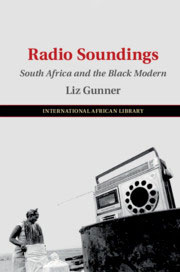 Radio Soundings: South Africa and the Black Modern
Radio Soundings: South Africa and the Black Modern
Liz Gunner
Zulu radio in South Africa is one of the most far-reaching and influential media in the region,
currently attracting around 6.67 million listeners daily. While the public and political role of
radio is well-established, what is less understood is how it has shaped culture by allowing
listeners to negotiate modern identities and fast-changing lifestyles. Liz Gunner explores how
understandings of the self, family, and social roles were shaped through this medium of voice and
mediated sound. Radio was the unseen literature of the auditory, the drama of the airwaves, and thus
became a conduit for many talents squeezed aside by apartheid repression. Besides Winnie Mahlangu
and K. E. Masinga among other talents, the exiles Lewis Nkosi and Bloke Modisane made a network of
identities and conversations which stretched from the heart of Harlem to the American South, drawing
together the threads of activism and creativity from both Black America and the African continent at
a critical moment of late empire. Published for the IAI by Cambridge University Press
ISBN 9781108556903, 300pp, December 2018
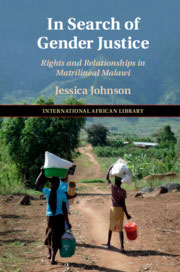 In Search of Gender Justice: Rights and Relationships in Matrilineal Malawi
In Search of Gender Justice: Rights and Relationships in Matrilineal Malawi
Jessica Johnson
What might gender justice look like in matrilineal Malawi? Ideas about gender and human rights have exerted considerable influence over African policy makers and civil society organisations in recent years, and Malawi is no exception. There, concerted efforts at civic education have made the concepts of human and women's rights widely accessible to the rural poor, albeit in modified form. In this book, Jessica Johnson listens to the voices of ordinary Malawian citizens as they strive to resolve disputes and achieve successful gender and marital relations. Through nuanced ethnographic description of aspirations for gender and marital relationships; extended analysis of dispute resolution processes; and an examination of the ways in which the approaches of chiefs, police officers and magistrates intersect, this study puts relationships between law, custom, rights, and justice under the spotlight. Published for the IAI by Cambridge University Press
ISBN: 9781108563031, October 2018
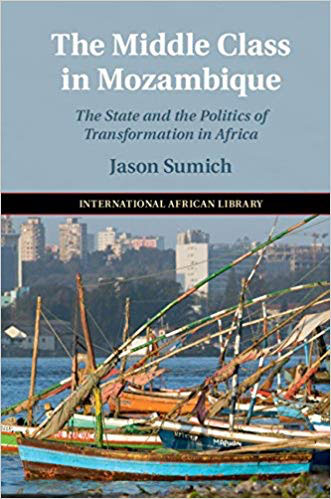 The Middle Class in Mozambique: The State and the Politics of Transformation in Southern Africa
The Middle Class in Mozambique: The State and the Politics of Transformation in Southern Africa
Jason Sumich
In recent years, the growth of a middle class has been a key feature of the 'Africa Rising' narrative. Here, Sumich explores the formation of this middle class in Mozambique, answering questions about the basis of the class system and the social order that gives rise to it. Drawing extensively on his fieldwork, Sumich argues that power and status in dominant party states like Mozambique derives more from the ability to access resources, rather than from direct control of the means of production. By considering the role of the state, he shows how the Mozambican middle class can both be bound to a system they benefit from and alienated from it at the same time, as well as exploring the ways in which the middle classes attempt to reproduce their positions of privilege and highlighting the deep uncertain future that they face. Published for the IAI by Cambridge University Press
ISBN: 9781108659659, October 2018
 Doing Business in Cameroon: An Anatomy of Economic Governance
Doing Business in Cameroon: An Anatomy of Economic Governance
Jose Maria Munoz
From the mid-1980s to the early 2000s, images of crisis and reform dominated talk of Cameroon's economy. Doing Business in Cameroon examines the aftermath of that period of turbulence and unpredictability in the northern city of Ngaoundéré. Taking the everyday encounters between business actors and state bureaucrats as its point of departure, the book vividly illustrates the backstage and interconnected dynamics of four different sectors (cattle trade, trucking, public contracting, and NGO work). Drawing on his training in law and social anthropology, the author is able to clarify intricate policy dynamics and abstruse legal developments for readers. A widespread picture emerges of actors grappling with the long-term implications of selective or suspended enforcement of legal rules. The book deftly illuminates a set of shifting configurations in which economic outcomes like monetary gains or the circulation of goods are achieved by foregoing the possibility of relying on or complying with the law. Published for the IAI by Cambridge University Press.
ISBN: 9781108684477, September 2018
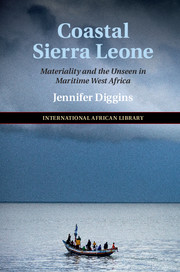 Coastal Sierra Leone: Materiality and the Unseen in Maritime West Africa
Coastal Sierra Leone: Materiality and the Unseen in Maritime West Africa
Jennifer Diggins
Against the backdrop of a threadbare post-war state and a global marine ecology in treacherous decline, Jennifer Diggins offers a dynamic account of post-war Sierra Leone, through the examination of a precarious frontier economy and those who depend on it. The book traces how understandings of intimacy, interdependence, and exploitation have been shaped through a history of indentured labour, violence, and gendered migration; and how these relationships are being renegotiated once more in a context of deepening economic uncertainty. At its core, this is about the material substance of human relationships. One can go a long way towards mapping the town's shifting networks of friendship, love, and obligation simply by watching the vast daily traffic in gifts of fish exchanging hands on the wharf. However, these mundane social and economic strategies are often inflected through a cultural dynamic of 'secrecy', and a shared sense of the unseen forces understood to inhabit the material world.
Published for the IAI by Cambridge University Press
ISBN: 9781108555647, June 2018
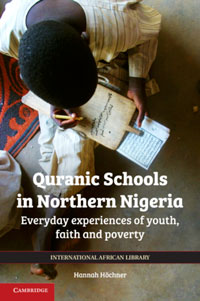 Quranic Schools in Northern Nigeria: Everyday Experiences of Youth, Faith, and Poverty
Quranic Schools in Northern Nigeria: Everyday Experiences of Youth, Faith, and Poverty
Hannah Hoechner
In a global context of widespread fears over Islamic radicalisation and militancy, poor Muslim youth, especially those socialised in religious seminaries, have attracted overwhelmingly negative attention. In northern Nigeria, male Qur'anic students have garnered a reputation of resorting to violence in order to claim their share of highly unequally distributed resources. Drawing on material from long-term ethnographic and participatory fieldwork among Qur'anic students and their communities, this book offers an alternative perspective on youth, faith and poverty. Mobilising insights from scholarship on education, poverty research and childhood and youth studies, Hannah Hoechner describes how religious discourses can moderate feelings of inadequacy triggered by experiences of exclusion, and how Qur'anic school enrolment offers a way forward in constrained circumstances, even though it likely reproduces poverty in the long run. A pioneering study of religious school students conducted through participatory methods, this book presents vital insights into the concerns of this much-vilified group.
Published for the IAI by Cambridge University Press
ISBN: 9781108348270, March 2018
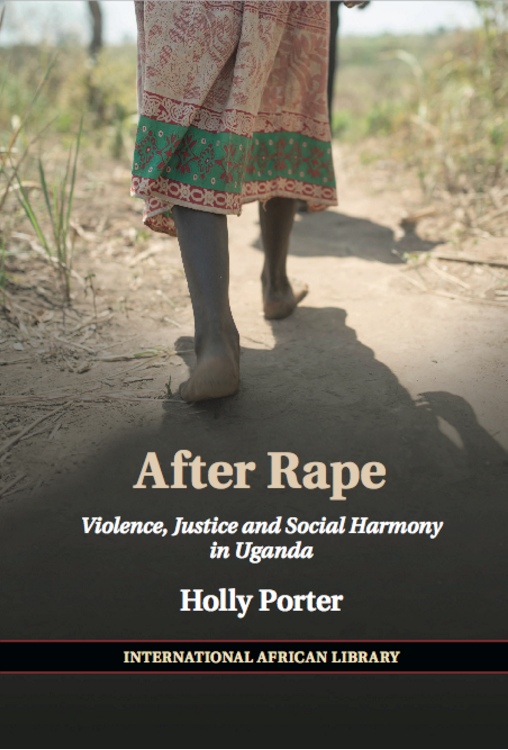 After Rape: Violence, Justice and Social Harmony in Uganda
After Rape: Violence, Justice and Social Harmony in Uganda
Holly Porter
Following the ICC intervention in 2005, northern Uganda has been at the heart of international justice debates. The emergent controversy, however, missed crucial aspects of Acholi realities: that the primary moral imperative in the wake of wrongdoing was not punishment but, instead, the restoration of social harmony. Drawing upon abundant fieldwork and in-depth interviews with almost 200 women, Holly Porter examines issues surrounding wrongdoing and justice, and sexual violence and rape, among the Acholi people in northern Uganda. This intricate exploration offers evidence of a more complicated and nuanced explanation of rape and its aftermath, suggesting a re-imagining of the meanings of post-atrocity justice, whilst acknowledging the role of sex, power and politics in all sexual experiences between coercion and consent. With its wide investigation of social life in northern Uganda, this provocative study offers vital analysis for those interested in sexual and gender violence, post-conflict reconstruction and human rights.
Published for the IAI by Cambridge University Press
ISBN: 9781107180048, November 2016
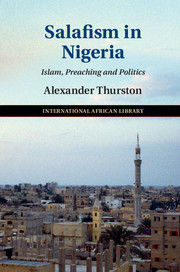 Salafism in Nigeria:
Islam, Preaching and Politics
Salafism in Nigeria:
Islam, Preaching and Politics
Alexander Thurston
The spectre of Boko Haram and its activities in Nigeria dominates both media and academic analysis of Islam in the region. But, as Alexander Thurston argues here, beyond the sensational headlines this group generates, the dynamics of Muslim life in northern Nigeria remain poorly understood. Drawing on interviews with leading Salafis in Nigeria as well as on a rereading of the history of the global Salafi movement, this volume explores how a canon of classical and contemporary texts defines Salafism. Examining how these texts are interpreted and – crucially – who it is that has the authority to do so, Thurston offers a systematic analysis of curricula taught in Saudi Arabia and how they shape religious scholars' approach to religion and education once they return to Africa. Essential for scholars of religion and politics, this unique text explores how the canon of Salafism has been used and refined, from Nigeria's return to democracy to the jihadist movement Boko Haram.
Published for the IAI by Cambridge University Press
ISBN 9781107157439, September 2016
 Pioneers of the Field: South Africa's Women Anthropologists
Pioneers of the Field: South Africa's Women Anthropologists
Andrew Bank
Focusing on the crucial contributions of women researchers, Andrew Bank demonstrates that the modern school of social anthropology in South Africa was uniquely female-dominated. The book traces the personal and intellectual histories of six remarkable women through the use of a rich cocktail of new archival sources, including family photographs, private and professional correspondence, field-notes and field diaries, published and other public writings and even love letters. The book also sheds new light on the close connections between their personal lives, their academic work and their anti-segregationist and anti-apartheid politics. It will be of interest to anthropologists, historians and students in African studies interested in the development of social anthropology in twentieth-century Africa, as well as by students and researchers in the field of gender studies.
Published for the IAI by Cambridge University Press
ISBN 9781107150492, 319pp, July 2016
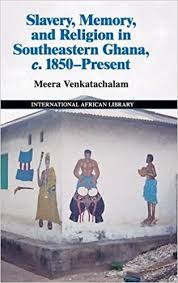 Slavery, Memory and Religion in Southeastern Ghana, c. 1850–Present
Slavery, Memory and Religion in Southeastern Ghana, c. 1850–Present
Meera Venkatachalam
Based on a decade of fieldwork in southeastern Ghana and analysis of secondary sources, this book aims to reconstruct the religious history of the Anlo-Ewe peoples from the 1850s. In particular, it focuses on a corpus of rituals collectively known as 'Fofie', which derived their legitimacy from engaging with the memory of the slave-holding past. The Anlo developed a sense of discomfort about their agency in slavery in the early twentieth century which they articulated through practices such as ancestor veneration, spirit possession, and by forging links with descendants of peoples they formerly enslaved. Conversion to Christianity, engagement with 'modernity', trans-Atlantic conversations with diasporan Africans, and citizenship of the postcolonial state coupled with structural changes within the religious system - which resulted in the decline in Fofie's popularity - gradually altered the moral emphases of legacies of slavery in the Anlo historical imagination as the twentieth century progressed.
Published for the IAI by Cambridge University Press
ISBN: 9781107108271, 300pp, August 2015
 Zimbabwe's Migrants and South Africa's Border Farms: The Roots of Impermanence
Zimbabwe's Migrants and South Africa's Border Farms: The Roots of Impermanence
Maxim Bolt
During the Zimbabwean crisis, millions crossed through the apartheid-era border fence, searching for ways to make ends meet. Maxim Bolt explores the lives of Zimbabwean migrant labourers, of settled black farm workers and their dependants, and of white farmers and managers, as they intersect on the border between Zimbabwe and South Africa. Focusing on one farm, it investigates the role of a hub of wage labour in a place of crisis. A close ethnographic study, this book addresses the complex, shifting labour and life conditions in northern South Africa's agricultural borderlands. Underlying these challenges are the Zimbabwean political and economic crisis of the 2000s and the intensified pressures on commercial agriculture in South Africa following neoliberal, post-apartheid land reform. But, amidst uncertainty, farmers and farm workers strive for stability. The farms on South Africa's margins are centres of gravity, islands of residential labour in a sea of informal arrangements.
Published for the IAI by Cambridge University Press
ISBN: 9781107111226, 300pp, August 2015
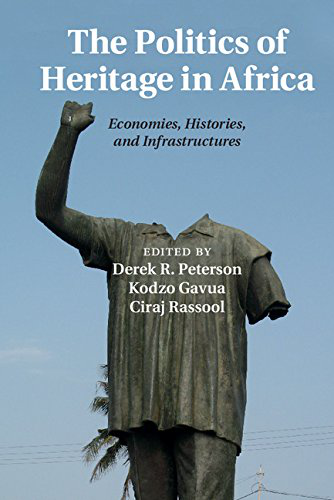 The Politics of Heritage in Africa: economies, histories, and infrastructures
The Politics of Heritage in Africa: economies, histories, and infrastructures
Edited by Derek R. Peterson, Kodzo Gavua and Ciraj Rassool
Heritage work has had a uniquely wide currency in Africa's politics. Secure within the pages of books, encoded in legal statutes, encased in glass display cases and enacted in the panoply of court ritual, the artefacts produced by the heritage domain have become a resource for government administration, a library for traditionalists and a marketable source of value for cultural entrepreneurs. The Politics of Heritage in Africa draws together disparate fields of study - history, archaeology, linguistics, the performing arts and cinema - to show how the lifeways of the past were made into capital, a store of authentic knowledge that political and cultural entrepreneurs could draw from. This book shows African heritage to be a mode of political organisation, a means by which the relics of the past are shored up, reconstructed and revalued as commodities, as tradition, as morality or as patrimony.
Published for the International African Institute by Cambridge University Press
ISBN: 9781107094857, c.320pp, February 2015.
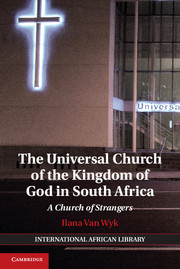 The Universal Church of the Kingdom of God in South Africa: a church of strangers
The Universal Church of the Kingdom of God in South Africa: a church of strangers
Ilana van Wyk
The Universal Church of the Kingdom of God (UCKG), a church of Brazilian origin, has been enormously successful in establishing branches and attracting followers in post-apartheid South Africa. Unlike other Pentecostal Charismatic Churches (PCC), the UCKG insists that relationships with God be devoid of ‘emotions’, that socialisation between members be kept to a minimum and that charity and fellowship are ‘useless’ in materialising God's blessings. Instead, the UCKG urges members to sacrifice large sums of money to God for delivering wealth, health, social harmony and happiness. While outsiders condemn these rituals as empty or manipulative, this book shows that they are locally meaningful, demand sincerity to work, have limits, and are informed by local ideas about human bodies, agency and ontological balance. As an ethnography of people rather than of institutions, this book offers fresh insights into the mass PCC movement that has swept across Africa since the early 1990s.
Published for the IAI by Cambridge University Press
ISBN 9781107057241, 300pp, 2014, hardback
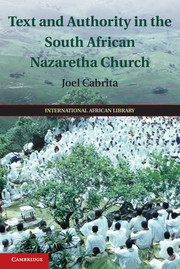 Text and Authority in the South African Nazaretha Church
Text and Authority in the South African Nazaretha Church
Joel Cabrita
This monograph gives an account of one of the largest African churches in South Africa, Ibandla lamaNazaretha, or Church of the Nazaretha. Founded in 1910 by charismatic faith-healer Isaiah Shembe, the Nazaretha church, with over four million members, has become an influential social and political player in the region. Deepl y influenced by a transnational evangelical literary culture, Nazaretha believers have patterned their lives upon the Christian Bible. They cast themselves as actors who enact scriptural drama upon African soil. But Nazaretha believers also believe the existing Christian Bible to be in need of updating and revision. For this reason, they have written further scriptures – a new 'Bible' – which testify to the miraculous work of their founding prophet, Shembe. Joel Cabrita's book charts the key role that these sacred texts play in making, breaking and contesting social power and authority, both within the church and more broadly in South African public life.
Published for the IAI by Cambridge University Press
ISBN, 9781107054431, 400pp, 2014, hardback
 Islam, Youth and Modernity in the Gambia. The Tablighi Jama'at
Islam, Youth and Modernity in the Gambia. The Tablighi Jama'at
Marloes Janson
This monograph deals with the sweeping emergence of the Tablighi Jama'at in the Gambia, a transnational Islamic missionary movement that has its origins in the reformist tradition that emerged in India in the mid-nineteenth century. It explores how the movement could appeal to the local Muslim population, youth and women in particular, in a West African setting. By recording the biographical narratives of five Gambian Tablighis, the book provides an understanding of the ambiguities and contradictions young people are confronted with in their (re)negotiation of Muslim identity. It analyses how Gambian youth go about their lives within the framework of neo-liberal reforms and renegotiated parameters informed by the Tablighi model of how to be a ‘true’ Muslim: interpreted as a believer who is able to reconcile his or her faith with a modern lifestyle.
Marloes Janson is a lecturer in anthropology at SOAS, University of London
Published for the IAI by Cambridge University Press.
ISBN 9781107040571, 255pp, October 2013
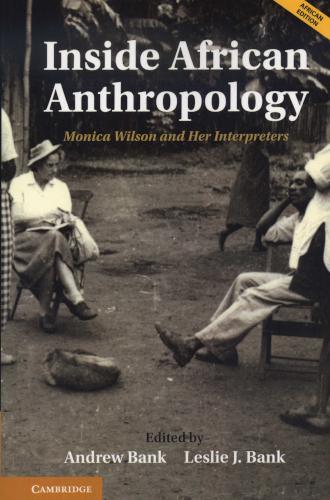 Inside African Anthropology. Monica Wilson and Her Interpreters
Inside African Anthropology. Monica Wilson and Her Interpreters
Edited by Andrew Bank and Leslie J. Bank
This book offers rare insights into the making of southern African anthropology through an analysis of the life and work of Monica Hunter Wilson, South Africa’s most distinguished anthropologist of the 20th century. Drawing on a massive personal archive, this biography of Hunter Wilson's life and work explores her main fieldwork and intellectual projects in southern Africa between the 1920s and the 1960s. The main focus of the book is on her fieldwork projects and the role of her interpreters, associates and collaborators in the production of anthropological knowledge.
...a rich and fascinating volume of papers on the life and work of the social anthropologist, Monica Wilson, addressing some major questions in the study of the politics of knowledge creation in Southern Africa. – Megan Vaughan
This book covers Wilson’s collaborative networks over decades, and thus it is a history of the field of anthropology more than a study of the individual. – Nancy Jacobs
ISBN 9781107029385 c.280pp. March 2013
 Witchcraft and a Life in the New South Africa
Witchcraft and a Life in the New South Africa
Isak Niehaus
Reconstructing the biography of an ordinary South African, Jimmy Mohale, this study casts new light on scholarly understandings of the connections between South African politics, witchcraft and the AIDS pandemic.
...demonstrates the power of small, intimate, contextualized detail…both moving and illuminating. – Donald L. Donham
Published for the IAI by Cambridge University Press.
ISBN 9781107016286 280pp. October 2012
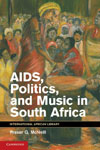 AIDS, Politics, and Music in South Africa
AIDS, Politics, and Music in South Africa
by Fraser G. McNeill
This book offers an original anthropological approach to the AIDS epidemic in South Africa, demonstrating why AIDS interventions in the former homeland of Venda have failed – and possibly even been counterproductive. It does so through a series of ethnographic encounters, from kings to condoms, which expose the ways in which biomedical understanding of the virus have been rejected by – and incorporated into – local understandings of health, illness, sex and death. The policy implications are clear: African worldviews must be taken seriously if AIDS interventions in Africa are to become successful.
McNeill's book brings fresh, illuminating, and, at times, revelatory material to a host of questions: the impact of chronic unemployment on the moral lives of the young; the politics of tradition in post-apartheid South Africa; and, of course, the highly contested meanings of HIV/AIDS.
– Jonny Steinberg
Published for the IAI by Cambridge University Press
Fraser McNeill is a Senior Lecturer in the Department of Anthropology and Archaeology at the University of Pretoria, South Africa.
ISBN: 9781107009912, c. 300pp, August 2011
 War and the Crisis of Youth in Sierra Leone
War and the Crisis of Youth in Sierra Leone
by Krijn Peters
The armed conflict in Sierra Leone and the extreme violence of the main rebel faction – the Revolutionary United Front (RUF) – have challenged scholars and members of the international community to come up with explanations. Up to this point though, conclusions about the nature of the war and the RUF are mainly drawn from accounts of civilian victims or based on interpretations and rationalisations offered by commentators who had access to only one side of the war. The present study addresses this currently incomplete understanding of the conflict by focusing on the direct experiences and interpretations of protagonists, paying special attention to the hitherto neglected, and often under-age, cadres of the RUF. The data presented challenge the widely canvassed notion of the Sierra Leone conflict as a war motivated by ‘greed, not grievance’. Rather, it points to a rural crisis expressed in terms of unresolved tensions between landowners and marginalised rural youth – an unaddressed crisis of youth that currently manifests itself in many African countries – further reinforced and triggered by a collapsing patrimonial state.
Krijn Peters, a rural development sociologist by background, is a lecturer in the Department of Political and Cultural Studies at Swansea University, Wales.
Published for the IAI by Cambridge University Press
ISBN: 9781107004191 270pp. January 2011
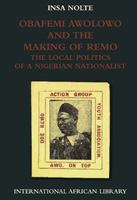 Obafemi Awolowo and the Making of Remo: the local politics of a Nigerian nationalist
Obafemi Awolowo and the Making of Remo: the local politics of a Nigerian nationalist
Insa Nolte
This book examines the evolution of a distinctive Yoruba community, Remo, and the central role played in this process by the Remo-born Nationalist politician and Yoruba leader Obafemi Awolowo (1909–87). Based on a subtle analysis of local-level politics, this book argues that participatory structures play an important role both in Yoruba politics and in the African postcolonial state. At the same time, it is an important contribution to the scholarly debate on one of Nigeria’s most important politicians.
This admirable and richly textured book should be widely read not only by those
interested in Yoruba history and modern Nigeria but by all those who seek a mature
understanding of the intricate connections between local and national politics. Nolte
provides powerful insights on the towering stature of Chief Obafemi Awolowo, the
preeminent politician of the era, along with the social dimensions of power, the richness of
political networks, institutional conflicts, the construction of mythologies of power and
popular loyalty, and many more crucial topics, all ably analyzed with clarity and precision. – Toyin Falola, University of Texas at Austin
(...) one of the most important books in Nigerian Studies in the last decade. – Olufemi Vaughan, Bowdoin College, Brunswick, Maine
(... ) provides a fascinating tapestry of Remo life, as well as the single best portrait available
of Awolowo’s background and personality (...) a model study of Africa’s past and present (...)
proclaims the arrival of a scholar of formidable gifts. – Tom C. McCaskie, Professor of the History of Africa, School of Oriental and African Studies
This study is not just about Obafemi Awolowo and Remo, it is a timely, rich and erudite addition to contemporary Yoruba socio-cultural and political history – Olukoya Ogen, Obafemi Awolowo University, Ile-Ife, Nigeria, and British Academy Visiting Fellow, Centre of West African Studies, University of Birmingham
Provides powerful insights on the towering stature of Chief Obafemi Awolowo, the preeminent politician of the era … the construction of mythologies and popular loyalty. – Toyin Falola, University of Texas at Austin
The single best portrait available of Awolowo’s background and personality …
a model study of Africa’s past and present.– T.C. McCaskie, School of Oriental and African Studies
The book was launched at SOAS in October 2009 at an event organised by the IAI and the Obafemi Awolowo Foundation. The launch was reviewed by the Nigerian Tribune ‘Arts and Review’ section. Read the review here (PDF). Reproduced by permission of the Nigerian Tribune.
To read an interview with the author about why she wrote the book published in the Nigerian Tribune, see a PDF of the interview here.
Insa Nolte is a lecturer at the Centre of West African Studies at the University of Birmingham.
ISBN 9780748638956 296pp. June 2009
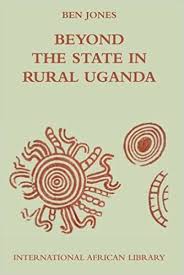 Beyond the State in Rural Uganda
Beyond the State in Rural Uganda
Ben Jones
In this innovative study, Ben Jones argues that scholars too often assume that the state is the most important force behind change in local political communities in Africa. Studies look to the state, and to the impact of government reforms, as ways of understanding processes of development and change. Using the example of Uganda, regarded as one of Africa's few ‘success stories’, Jones chronicles the insignificance of the state and the marginal impact of Western development agencies. He offers a new anthropological perspective on how to think about processes of social and political change in poorer parts of the world.
…well researched and highly readable. Jones’ prose is accessible and concise, making it an attractive option for classroom use…advanced undergraduate students in anthropology, history and development studies would find much value in this text. Graduate students and specialists will also appreciate Jones’ ability to integrate sophisticated theoretical arguments into a compelling ethnohistorical analysis.
– International Journal of African Historical Studies
…a very readable book and one that challenges current development discourses with good ethnography and historical scholarship. – African Studies Review
A fascinating and convincing book… – Journal of African History
…a welcome addition to the recent ethnographic literature on East Africa.
– Social Anthropology
Ben Jones is an anthropologist and lecturer in social policy at the University of East Anglia.
Ben Jones is providing in-depth background analysis to the Guardian’s ‘Katine’ development project in Uganda. For more information, and to read his articles, click here . Or read his remarks on the relationship between the development project and the media here.
ISBN 978-0748635191, 224pp. 2008, hardback
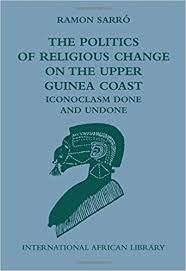 The Politics of Religious Change on the Upper Guinea Coast: iconoclasm done and undone
The Politics of Religious Change on the Upper Guinea Coast: iconoclasm done and undone
Ramon Sarro
Based on research spanning over twelve years, this is an in-depth analysis of an iconoclastic religious movement initiated by a Muslim preacher among coastal Baga farmers in the French colonial period. With an ethnographic approach that listens as carefully to those who suffered iconoclastic violence as to those who wanted to 'get rid of custom', Sarro discusses the extent to which iconoclasm produces a rupture of religious knowledge and identity, and analyses its relevance in the making of modern nations and citizens. The book will appeal to readers with an interest in the anthropology of religion, iconoclasm, the history and anthropology of West Africa, or the politics of heritage.
...represents a distinguished contribution to the historical sociology of the State in Africa, and in particular to an understanding of the origins of the Guinean nationalist movement... Ramon Sarro brings us a page-turner on the social history of one of the least well known states in West Africa...this is how political sociology, specifically comparative political sociology, should be written...that leads to a more general statement not only about the origin of the State but also about iconoclasm. - Jean-François Bayart, Sociétés politiques comparées
…a richly documented contribution to the anthropology of modernity…historical ethnography [that] attests to an impressive historical scholarship written with strong empathy…a standing contribution to the historical and cultural knowledge of the Upper Guinea Coast…. - Social Anthropology
…unique, compelling to read, and broadly significant. – Islamic Africa
Ramon Sarro is at the University of Oxford.
ISBN 9780748635153, 256pp. 2008, hardback
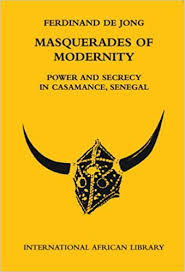 Masquerades of Modernity: power and secrecy in Casamance, Senegal
Masquerades of Modernity: power and secrecy in Casamance, Senegal
Ferdinand de Jong
The Jola and Mandinko people of the Casamance region in Senegal have always used their rituals and performances to incorporate the impact of Islam, colonialism, capitalism, and contemporary politics. Their performances of secrecy have accommodated these modern powers and continue to do so today. The performers incorporate the modern and redefine modernity through secretive practices. Their traditions are not modern inventions, but traditional ways of dealing with modernity.
How do those on the margins of modernity face the challenges of globalization? This book demonstrates that secrecy is one of the means by which a society on the fringe of modernity produces itself as locality. Focusing on initiation rituals, masked performances and modern art, this study shows that rituals and performances long deemed obsolete, serve the insertion of their performers in the world at their own terms.
The book will interest anthropologists, historians, political scientists and all those studying how globalisation affects peripheral societies. It shows that secrecy, performed as a weapon of the weak, empowers their performers. Secrecy serves to mark boundaries and define the local in the global.
…a solid and thought-provoking engagement with contemporary theoreticians; affording the study of masking its rightful place at the forefront of contemporary anthropological thinking. – Social Anthropology.
…constitutes a major contribution to anthropological and art historical literature about rituals, masquerades, and identity in postcolonial West Africa. – African Studies Review.
Weaving together different domains and social spaces in which politics, gender, kinship, identity, economy and religion(s) meet, Ferdinand de Jong has written a rich, stimulating and nuanced text that provides a kaleidoscopic view. – Politique africaine.
…a brief but highly original monograph. – African Arts
…provides important insights into the complexity of multiethnic urban cultural developments in the Casamance area of southern Senegal. – International Journal of African Historical Studies
Ferdinand de Jong is a lecturer at the University of East Anglia.
ISBN 9780748633197, 256pp. 2007, hardback.
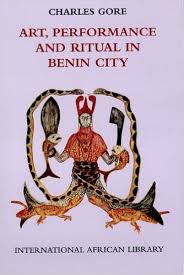 Art, Performance and Ritual in Benin City
Art, Performance and Ritual in Benin City
Charles Gore
This book explores the roles of contemporary urban shrines and their visual traditions in Benin City. It focuses on the charismatic priests and priestesses who are possessed by a pantheon of deities, the communities of devotees, and the artists who make artifacts for their shrines. The visual arts are part of a wider configuration of practices that include song, dance, possession and healing. These practices provide the means for exploring the relationships of the visual to both the verbal and performance arts that feature at these shrines. The analysis in this book raises fundamental questions about how the art of Benin, and non-Western art histories more generally, are understood. The book throws critical light on the taken-for-granted assumptions which underpin current interpretations and presents an original and revisionist account of Benin art history.
…a seminal book on the urban shrines of Benin City, Nigeria…a densely com- posed work of anthropology. – Africa: journal of the International African Institute
Charles Gore is Lecturer in the History of African Art, School of Oriental and African Studies, University of London.
ISBN 9780748633166, 256pp. 2007, hardback.
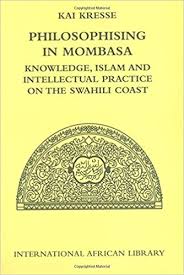 Philosophizing in Mombasa: knowledge, Islam and intellectual practice at the Swahili coast
Philosophizing in Mombasa: knowledge, Islam and intellectual practice at the Swahili coast
Kai Kresse
Philosophising in Mombasa provides an approach to the anthropological study of philosophical discourses in the Swahili context of Mombasa, Kenya. In this historically established Muslim environment, at the dawn of the twenty-first century, philosophy is investigated as social discourse and intellectual practice, situated in everyday life. This is done from the perspective of an 'anthropology of philosophy'.
This book won an honorable mention in the African Studies Association 2008 Melville J. Herskovits Award.
Kai Kresse’s key aim in this engaging book is to establish the possibility of a study of philosophy in an African context…[it is also] an immensely useful source on the changing nature of Islam on the Kenya coast in the last three decades. – Africa: journal of the International African Institute
…takes us definitively away from the old debates about ethnophilosophy into the new terrain of African philosophy as intellectual practice, as the production of knowledge as wisdom. – Henrietta Moore
Kai Kresse is at Columbia University.
ISBN 9780748627868, 288pp. 2007, hardback.
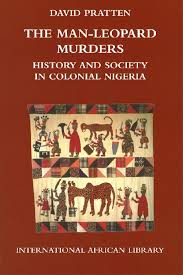 The Man-Leopard Murders: history and society in colonial Nigeria
The Man-Leopard Murders: history and society in colonial Nigeria
David Pratten
This book is an account of murder and politics in Africa, and an historical ethnography of southern Annang communities during the colonial period. Its narrative leads to events between 1945 and 1948 when the imperial gaze of police, press and politicians was focused on a series of mysterious deaths in south-eastern Nigeria attributed to the 'man-leopard society'. These murder mysteries, reported as the 'biggest, strangest murder hunt in the world', were not just forensic but also related to the broad historical impact of commercial, Christian and colonial aid relations on Annang society.
…provides a fascinating insight into a relatively under-researched colonial society… a masterpiece of reflection on the interwoven strands of Annang history and society…it will surely stand the test of time.
– H-Africa
This book won the Amaury Talbot Prize for African Anthropology 2007, awarded by the Royal Anthropological Institute.
David Pratten is University Lecturer in the Social Anthropology of Africa at the University of Oxford.
ISBN 780748625536, 448pp. 2007, hardback.
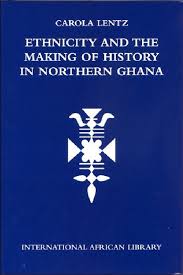 Ethnicity and the Making of History in Northern Ghana
Ethnicity and the Making of History in Northern Ghana
Carola Lentz
Drawing on two decades of research this social and political history of North-Western Ghana traces the creation of new ethnic and territorial boundaries, categories and forms of self-understanding, and represents a major contribution to debates on ethnicity, colonialism and the ‘production of history’. It explores the creation and redefinition of ethnic distinctions and commonalities by African and European actors, showing that ethnicity’s power derives from a contradiction: while ethnic identities purport to be non-negotiable, creating permanent bonds, stability and security, the boundaries of the communities created and the associated traits and practices are malleable and adaptable to specific interests and contexts.
…provides one of the most significant contributions in recent years to understanding the intersection of notions of belonging and conceptions of power common among Africans during the nineteenth and twentieth centuries… The book’s actor-oriented perspective of African history and politics provides a fuller understanding of African experiences in colonial and postcolonial Africa than the more common top-down approaches…
– H-Net Reviews
…thoroughly researched, well written and grounded in the lived experiences of the Dagara. – African Studies Review
…a scholarly work that is an important addition to the history of northern Ghana. – Africa: journal of the International African Institute
Carola Lentz is professor at the Department of Anthropology and African Studies at the Johannes Gutenberg University in Mainz, Germany.
ISBN ISBN 9780748624010, 384pp. 2006, hardback.
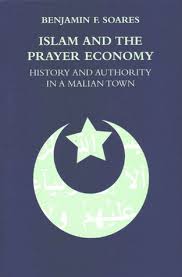 Islam and the Prayer Economy: history and authority in a Malian town
Islam and the Prayer Economy: history and authority in a Malian town
Benjamin Soares
At a time when so-called fundamentalism has become the privileged analytical frame for understanding Muslim societies past and present, this study offers an alternative perspective on Islam. Soares provides a richly detailed discussion of Sufism, Islamic reform, and other contemporary ways of being Muslim in Mali and offers an original analytical perspective for understanding changes in the practice of Islam more generally.
‘A quite remarkable work, based on extensive well informed field work’ – David Robinson, Professor of History and African Studies Michigan State University
‘This is a well-written book that provides an insightful analysis of a Muslim society undergoing profound change’ – Louis Brenner, Emeritus Professor of the History of Religion School of Oriental and African Studies
Benjamin F. Soares is at the University of Florida, Gainesville.
ISBN ISBN 9780748623587, 320pp. 2005, hardback. ISBN: 9780748623587, paperback.
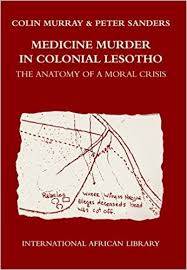 Medicine Murders in Colonial Lesotho: the anatomy of a moral crisis
Medicine Murders in Colonial Lesotho: the anatomy of a moral crisis
Colin Murray and Peter Sanders
Medicine murder involved the cutting of body parts from victims, usually while they were still alive, to be used for the preparation of medicines intended to enhance the power of the perpetrators. A ‘very startling’ increase in cases of medicine murder apparently took place in Basutoland (now Lesotho) in southern Africa in the late 1940s and the early 1950s. It gave rise to a dramatic crisis of late colonial rule. Was this increase a real one? If so, why did it happen? How far does if explain the crisis? What other factors contributed?
‘A stunning contribution to studies which seek to get under the skin of the relationship between violence and political power in Africa... This book is destined to be one of the classics of African historical and anthropological studies.’ – Richard Rathbone, formerly Professor of African History, School of Oriental and African Studies.
ISBN 9780748622849, xvi + 494 pp, 2005, hardback.
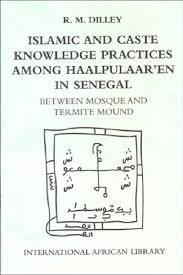 Islam and Caste Knowledge Practices among Haalpulaar’en in Senegal
Islam and Caste Knowledge Practices among Haalpulaar’en in Senegal
Roy Dilley
This book examines in historical perspective the hitherto little-studied relationship between Islam and caste among the Haalpulaar'en of Senegal. The Islamic uprising of the 1770s, which established a class of Islamic clerics in positions of authority in the Senegal river valley, had long-term consequences for the social relations between clerics and caste groups. The book examines how at different historical junctures attempts were made to negotiate the equalitarian claims of a universalist faith with the expression of social differentiation lying at the heart of caste inequality. While the existing literature focuses on those who established Islam within the region, this present work provides insights into how marginalised artisans, poets and musicians understood themselves and how they responded to a faith which had become the cornerstone of social prestige and status. It analyses the knowledge practices of clerics and cultural distinction. This involves a synthesis of historical sources and ethnography and provides an innovative approach to the study of religious identity and specialist practitioners.
Roy Dilley is Senior Lecturer in Social Anthropology, University of St Andrews, Scotland.
ISBN ISBN 9780748619900, 270pp. 2004, paperback.
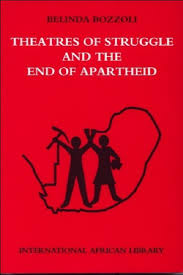 Theatres of Struggle and the End of Apartheid
Theatres of Struggle and the End of Apartheid
Belinda Bozzoli
This is a compelling study of the origins and trajectory of a legendary black uprising against apartheid - the Alexandra Rebellion of 1986. Using insights from the literature on collective action and social movements, it delves deep into the rebellion’s inner workings. It examines how the residents of Alexandra - a poverty-stricken, segregated township in Johannesburg - manipulated and overturned the meanings of space, time and power in their sequestered world; how they used political theatre to convey, stage and dramatise their struggle; and how young and old residents generated differing ideologies and tactics, giving rise to a distinct form of generational politics. Theatres of Struggle asks the reader to enter into the world of the rebels, and to overcome the moral complexity and social duress they experienced as they invented new social forms and violently attacked old ones.
Belinda Bozzoli is at the University of the Witwatersrand, Johannesburg.
ISBN 9780748619412, 336pp. 2004, paperback.
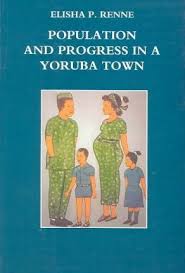 Population and Progress in a Yoruba Town
Population and Progress in a Yoruba Town
Elisha Renne
This study of local perceptions of population and development in a rural south-western Nigerian town questions some of the underlying assumptions of the demographic theory of fertility transition. Fertility transition theory, along with modernity theory from which it derives, have not explained why fertility remains high, particularly in sub-Saharan Africa, despite the fact that some Westernising preconditions have been met nor why development, despite a plethora of projects, has failed to ‘take-off’. As this study demonstrates, neither fertility change nor development follows a universal trajectory. Whether lower fertility or Western models of development are viewed as possible or advantageous reflects cultural ideas about proper social relations as well as political economic conditions, which hinder or facilitate these changes.
Elisha P. Renne is a professor in the Department of Anthropology and the Center for Afro-American and African Studies, University of Michigan.
ISBN ISBN 9780748618156, 256pp. 2004, paperback.
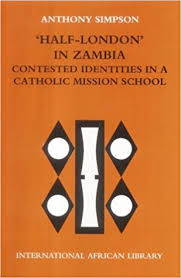 ‘Half-London’ in Zambia: contested identities in a Catholic mission school
‘Half-London’ in Zambia: contested identities in a Catholic mission school
Anthony Simpson
‘Half-London’ describes and analyses life in ‘St Antony’s’, a Zambian Catholic boys’ mission boarding school in the 1990s, using the context-sensitive methods of social anthropology. Drawing upon Michel Foucault’s notion of the panoptic gaze, Anthony Simpson demonstrates how students are both drawn to mission education as a ‘civilising process’, yet also resist many of the lessons that the official institution offers, particularly with respect to claims of ‘true’ Christian identity and educated masculinity. The book offers unparalleled detail and insight into the contributions of mission schooling to the processes of postcolonial identity formation in Africa. Its rich and compelling ethnography enables readers to get a real sense of everyday life within the school and raises compelling questions about identity in plural societies beyond the confines of St Antony’s.
This is an outstanding ethnography of an African school. The reader is taken into the life-world of St Antony’s, and made to feel right there, moving within the distinctive cultural geography of the school.’ – Paul Willis, author of Learning to Labour
Anthony Simpson taught at the Zambian Catholic mission boys’ boarding school from 1974 to 1997. He arrived in Zambia as an English teacher, but his involvement in the day-to-day life of St Antony’s led him to an interest in anthropology and psychology.
ISBN 9780748618040, 224pp. 2003, paperback.
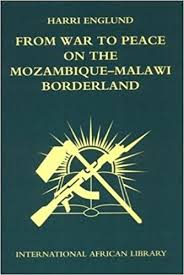 From War to Peace on the Mozambique-Malawi Borderland
From War to Peace on the Mozambique-Malawi Borderland
Harri Englund
The first full-length ethnography to tell villagers' stories from war to peace in Mozambique. Extended case studies of particular villages and families on the Mozambique-Malawi borderland form the core of the book. The detailed study takes the reader beyond the stereotypes which often accompany interventions into humanitarian catastrophes. The villagers in this book are not nameless victims but persons with social relationships, participants, in their own ways, in the histories of colonialism, nationalism, labour migration, guerrilla war, exile, repatriation and, most recently, liberal democracy. Those interested in humanitarian catastrophes, African politics, refugee studies and development studies will be inspired by its detailed rebuttal of stereotypes which continue to represent Africans as helpless victims.
Harri Englund is Professor at the University of Cambridge.
ISBN 9780748615773 232pp. 2001, paperback.
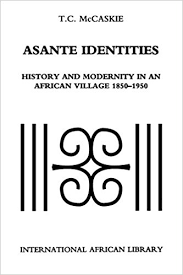 Asante Identities: history and modernity in an African village, 1850-1950
Asante Identities: history and modernity in an African village, 1850-1950
T.C. McCaskie
This study of the people of the Asante village of Adeebeba - now part of Kumase, Ghana's second city - over the century 1850 to 1950 is unparalleled in its wealth of detail about the concerns of ordinary African men and women in a period of tumultuous change. In exploring their testmony in all its rich diveristy, McCaskie draws out its larger implications for the understanding of Asante identities in a world overtaken by colonialism and modernity. Community and belonging, politics and belief, rural and urban lifestyles, money, mobility and sex, and all the other daily concerns of Adeebeba villagers are discussed in depth. The result is a book that is unequalled in its recuperation of the African past through African voices.
ISBN 9780748615100, 288pp. 2000, paperback.
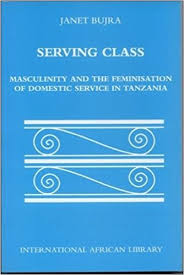 Serving Class: masculinity and the feminisation of domestic labour in Tanzania
Serving Class: masculinity and the feminisation of domestic labour in Tanzania
Janet Bujra
This is a book about contradictions: about the men who were better at housework than women and still retained their view of themselves as real men. In colonial Tanganyika, when housework for some was transformed into wage labour for others, the only available labour force was predominantly male, so men became servants, even nursemaids to babies. Even today men are preferred over women as servants.
And equally contradictory: how did an institution so sharply expressing class differences persist in a period when the Tanzanian state was proclaiming 'socialism' and the end of class exploitation? Exploring the institution of domestic service discloses processes of postcolonial class formation both as exploitation and cultural elaboration. It also uncovers gender struggles amongst workers and those who employ them.
ISBN 9780748614844, 288pp. 2000, paperback.
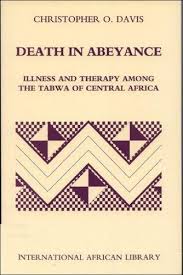 Death in Abeyance: illness and therapy among the Tabwa of Central Africa
Death in Abeyance: illness and therapy among the Tabwa of Central Africa
Christopher O. Davis
This is a comprehensive survey, in both its theory and its practice, of the medical system of the Tabwa who live on the western shore of Lake Tanganyika in the Democratic Republic of Congo (formerly Zaire). Based on four years of fieldwork, Davis's book is the most complete study so far of an African therapeutic system. In contrast to most ethnographies of medicine, which take social structure as primary and treat medical knowledge as an extension or reflection of it, this study focuses on the medical system itself. When medicine is thus considered first as an indigenous or vernacular science, it is soon seen that much of what passes for an understanding of ritual, magic and religion in Africa is thin and misconceived.
Christopher Davis is a Lecturer in the Department of Anthropology and Sociology at the School of Oriental and African Studies, London
ISBN 9780748613052 342pp. 2000, paperback.
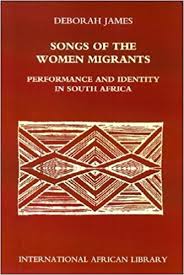 Songs of the Women Migrants: performance and identity in South Africa
Songs of the Women Migrants: performance and identity in South Africa
Deborah James
Kiba is a genre of `traditional' music in South Africa. This book is about its performance and social meaning. Women migrants from the country's Northern Province have developed the genre, formerly an exclusively male one, in vibrant and stimulating ways. Through an exploration of the richness and variety of the songs, the social background to their performance, the life-histories of female performers, and the women's own running commentaries, Deborah James opens up novel pathways of interpretation of the significance of such music.
As working migrants - and mothers - who have experienced poverty, the subordination of `custom' and the harsh constraints of apartheid, the women express the realities of their lives in distinct cultural idiom. Through the dual role of musical expert and family breadwinner, they have charted their own paths through the difficulties of everyday life in an oppressive environment. The author offers new perspectives on the experience of domestic service on the urban Witwatersrand in recent decades: on changing relationships between town and country; and on the ways in which the women define themselves as ethnic subjects through their performance of kiba. A major strength of the analysis is the vigour and liveliness with which women reflect on their own experiences.
Deborah James is professor in social anthropology at the London School of Economics.
ISBN 9780748613045, 248pp. 1999, paperback.
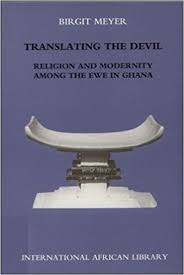 Translating the Devil: Religion and Modernity among the Ewe in Ghana
Translating the Devil: Religion and Modernity among the Ewe in Ghana
Birgit Meyer
This book offers an ethnography of the emergence of local Christianity and its relation to changing social, political and economic formations among the Peki Ewe in Ghana. The main argument is that, for the Ewe, involvement with modernity goes hand in hand with new enchantment, rather than disenchantment, of the world. Comparing discourses and ritual practices of mission as well as Pentecostal churches, the study reveals that the latter pay much more attention to Satan – especially through `deliverance' rituals. With its emphasis on the hybrid image of the Devil and people's obsession with occult forces as a way to mediate the attractions and discontents of modernity, this book sheds light on a hitherto neglected dimension in studies of African Christianity.
Birgit Meyer is a professor at the University of Utrecht.
ISBN 9780748613038, 288pp. 1999, paperback.
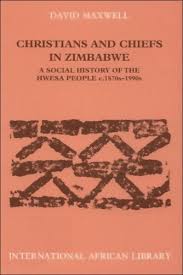 Christians and Chiefs in Zimbabwe: a social history of the Hwesa People, 1870s-1990s
Christians and Chiefs in Zimbabwe: a social history of the Hwesa People, 1870s-1990s
David Maxwell
This social history of a remote chiefdom in north-east Zimbabwe advances local level studies of African Christianity and politics. The book also analyses the historical roots of chieftaincy's current importance. It explores the role of chiefs in the invention of tradition, the imagination of ethnicity and the defence of local interests against an interventionist state. The doctoral dissertation on which this book is based won the Audrey Richards Prize awarded by the African Studies Association of the UK for the best African Studies thesis, 1994-96.
David Maxwell is Professor of African History at University of Cambridge.
ISBN 9780748611300, 288pp. 1999, paperback.
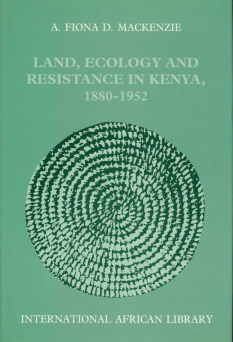 Land, Ecology and Resistance in Kenya, 1880–1952
Land, Ecology and Resistance in Kenya, 1880–1952
Fiona McKenzie
The book examines the gender and class dimensions of resistance to colonial rule in the context of struggles over the control and use of land in Murang'a (then Fort Hall) District in Kenya between 1880 and 1952. The objective is, first, to expose the process through which colonial rule was effected through the creation of discourses of `betterment' and `environmentalism'. The author demonstrates how, by this means, the state attempted to remove the deeply political issue of land distribution between African and European from the realm of politics, and recast it in what was claimed to be the neutral language of legal regimes and of western science and technology. The second objective is to recvoer the gender and class dimensions of counternarratives which challenged the colonial administration. Drawing on the stories of elderly people still living in Murang'a, in the mid 1980s, in order to challenge the discourse of colonial documents, the author shows how both public and everyday forms of resistance were an integral part of the politics of resistance to colonial rule.
ISBN 9780748610204, 256pp. 1998, hardback.
 An African Niche Economy: farming to feed Ibadan 1868-88
An African Niche Economy: farming to feed Ibadan 1868-88
Jane Guyer
Of the several forces reshaping West African rural societies and economies in the post-colonial period one of the most pervasive is the rapid growth of urban demand. This case study of a Yoruba community in the food supply hinterland of Ibadan tells the social and agricultural history of its various producers over twenty years: from the Nigerian civil war, via the oil boom and bust, to structural adjustment. The final section draws together all the threads and discusses the interplay amongst the technical repertoire for production in a savanna ecology, forces emanating from the political economy of the urban hinterland, and the tenets of Yoruba occupational culture.
ISBN ISBN 9780748609314, 1997, 224pp. hardback. ISBN: 9780748610334, paperback.
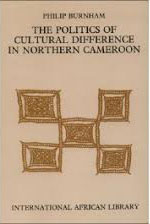 The Politics of Cultural Difference in Northern Cameroon
The Politics of Cultural Difference in Northern Cameroon
Philip Burnham
Northern Cameroon is a region of great cultural diversity - populated by the politically dominant Fulbe, the pastoral Mbororo, and by farming populations such as the Gbaya. This study, based on research spanning 25 years, focuses on the shifting patterns of social assimilation and exclusion that have characterised the inter-ethnic relations of this region for almost two centuries. The analysis is brought up to the 1990s, when the decline of the Cameroon state, linked with World Bank structural adjustment policies as well as the growing importance of ethnic associations, NGOs, and international bodies (including Islamic reformist movements and Christian missions), has had a major impact on ethnic conflicts and political mobilisation in the region. Engaging in debates on the `invention' of tradition, the deconstruction of ethnicity, and the nature of the modern African state, this book makes a major contribution to the analyses of ethnic politics, and the risks and possibilities of democratisation, in Africa.
Philip Burnham is Emeritus Professor of Anthropology at University College London.
ISBN 9780748608126, 272pp. 1996, hardback.
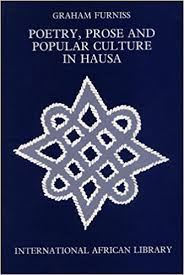 Poetry, Prose and Popular Culture in Hausa
Poetry, Prose and Popular Culture in Hausa
Graham Furniss
Introducing poetry, prose, songs and theatre from Nigeria, this engaging volume blends translated extracts with a rich commentary on the historical development and modern context of this creative culture. Examines imaginative prose-writing, the tale tradition, popular song, Islamic religious poetry and modern TV drama.
978-0-7486-0786-0 368pp. 1996, paperback
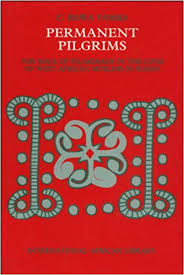 Permanent Pilgrims: the role of pilgrimage in the lives of West African Muslims in Sudan
Permanent Pilgrims: the role of pilgrimage in the lives of West African Muslims in Sudan
C. Bawa Yamba
West African pilgrims in Sudan believe that walking across the savannas and desert, with all the hardships that such a journey entails, is the only proper way of performing the Islamic pilgrimage to Mecca. Their journey, however, appears to stop halfway in Sudan, where most of them reside in stranger enclaves as fourth- and fifth-generation immigrants. Yet these pilgrims define themselves as transients, and see these villages as temporary stations on their way to Mecca. This book examines life in a set of West African pilgrim villages in Sudan to show how such a pilgrimage is maintained. It examines why these people allow themselves to live in a state of permanent transition, and argues that here pilgrimage is a symbolic journey analogous to life itself.
ISBN 9780748605927, 240pp. 1995, hardback.
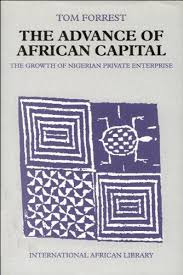 The Advance of African Capita: the growth of Nigerian private enterprise
The Advance of African Capita: the growth of Nigerian private enterprise
Tom Forrest
Combining ethnographic and historical perspectives, this study examines the strategies and patterns of development employed by business people from the colonial period to the present day. Not only an invaluable digest of Nigeria's business activity, this important study also challenges existing views about African enterprise and is highly relevant to policy-makers concerned with economic development.
ISBN 9780748604920, 256pp. 1994, hardback.
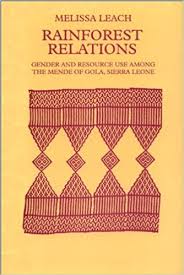 Rainforest Relations: gender and resource use among the Mende of Gola, Sierra Leone
Rainforest Relations: gender and resource use among the Mende of Gola, Sierra Leone
Melissa Leach
With environmental change and conservation in West Africa's tropical rainforests being topics of political and academic attention, Rainforest Relations brings the perspective of the forest dwellers themselves to the debate.
Based on detailed research in the Mende communities around Gola North Forest Reserve in Sierra Leone, this innovative book examines the different relationships women and men have with their environment. Surveying the recent debates and literature concerning forest conservation in this area, as well as current analytical approaches to gender and the environment, Melissa Leach examines the importance of rainforest resources to the local economy and social relations, and shows that neither an understanding of forest use and change, nor adequate conservation policies, can be achieved without a concern for gender.
Melissa Leach is at the Institute of Development Studies, University of Sussex.
ISBN 9780748604937, 304pp. 1994, hardback.
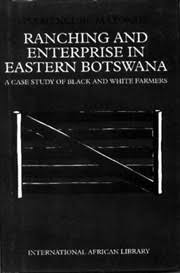 Ranching and Enterprise in Eastern Botswana: a case study of black and white farmers
Ranching and Enterprise in Eastern Botswana: a case study of black and white farmers
Isaac N. Mazonde
While Botswana's economic development has been extraordinary, little is known about how different social groups have adapted to the new economic opportunities. This comprehensive account studies a key group of the ranchers. It describes their changing lifestyles, their construction of personal and social space, and the way they have adapted to state-initiated political and economic change, showing through a series of case studies how ranching has grown from being the preserve of white settlers to include Botswana and other African farmers as well.
978-0-7486-0467-8 224pp. 1994, hardback.
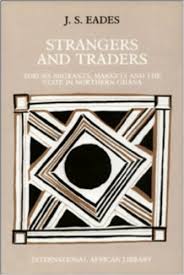 Strangers and Traders: Yoruba migrants, markets and the state in Ghana
Strangers and Traders: Yoruba migrants, markets and the state in Ghana
Jeremy Eades
In the inter-war years, groups of enterprising Yoruba traders from a few towns in Western Nigeria established a successful trading network throughout the Gold Coast (Ghana). Then, in 1969, they were abruptly ordered to leave the country. At the time of the exodus, Jerry Eades followed the traders back to Nigeria. There, on the basis of extensive interviews and archival sources, he reconstructed the history of the migration from four Yorubu towns to northern Ghana. The result is one of the fullest and most detailed accounts of chain migration and its implications for economic development ever written.
ISBN 9780748603862, 234pp. 1993, hardback.
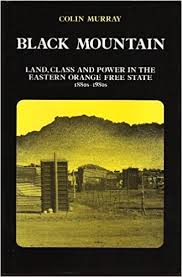 Black Mountain: land, class and power in the Orange Free State 1880s-1980s
Black Mountain: land, class and power in the Orange Free State 1880s-1980s
Colin Murray
A remarkable chronicle of the struggles of many people – black and white – whose lives were rooted in the largest slum in South Africa, Botshabelo – a massive concentration of poverty and unemployment. The stories told by the inhabitants of the slum in 1980 led to this book. Detailed archival evidence and contemporary oral history illuminate all the important themes of the political economy of the rural highveld of South Africa from the mineral revolution of the late nineteenth century to the erosion of apartheid in the late twentieth century.
978-0-7486-0344-2 340pp. 1992, hardback.
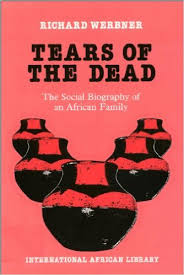 Tears of the Dead: the social biography of an African family
Tears of the Dead: the social biography of an African family
Richard Werbner
Illuminating 100 years of family history in Western Zimbabwe, from the colonial period to the present, this social biography is the first account of its kind for southern Africa. At the heart of the book are the life histories of several generations of Kalanga men and women in a single extended family. Together they chronicle the family's endurance and empowerment in the face of large scale eviction, displacement from home, the threat of imposed resettlement, guerrilla war, and near starvation in a food blockade.
ISBN 9780748603312, 212pp. 1991, paperback.
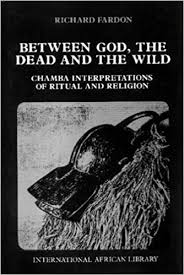 Between God, Dead and the Wild: Chamba interpretations of ritual and Religion
Between God, Dead and the Wild: Chamba interpretations of ritual and Religion
Richard Fardon
Based on observations in two West African villages – one a traditionally uncentralised community in contemporary Nigeria, the other a small chiefdom in Cameroon - this study shows that despite basic presuppositions regarding various types of being, the beliefs of the two groups manifest themselves in quite different ways. Focusing particularly on Chamba conceptions of people, masks and cults, Richard Fardon applies contemporary social theory to Chamba religion and shows how particular individuals integrate their concerns with notions of human purpose, the agricultural cycle and the values of the wilds.
Richard Fardon is Professor of Social Anthropology at the School of Oriental and African Studies, University of London.
ISBN 9780748602223, 288pp. 1990, hardback. ISBN: 9780748602841, paperback.
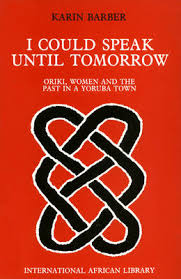 I Could Speak Until Tomorrow: Oriki, women and the past in a Yoruna town
I Could Speak Until Tomorrow: Oriki, women and the past in a Yoruna town
Karin Barber
In Yoruba culture oriki, or oral praise poetry, is a major part of both traditional performance and daily life, and as such reflects social change and structure both past and present. Karin Barber studies the oriki poetry of Okuku, a small town in the Oyo state of Nigeria. She shows how women, the main performers of the oriki, interpret the poems and examines the links it gives them between living and dead, human and spiritual, and present and past.
Karin Barber is a professor at the Centre for West African Studies, University of Birmingham.
ISBN 9780748602100, 432pp. 1991, hardback. ISBN: 9780748602872, paperback.
Controlling Anger: the sociology of Gisu Violence
Suzette Heald
1989, Available via James Currey Publishers. Link
Identities on the Move: clanship and pastoralism in northern Kenya
Günther Schlee
1989, out of print.
Migrants No More: settlement and survival in Mambwe villages, Zambia
Johan Pottier
1988, out of print.
The Maasai of Matapato: A study of rituals of rebellion
Paul Spencer
Available in Routledge Classic Ethnographies.
First published 1988.
Feeding African Cities: studies in regional social history
Edited by Jane Guyer
Available from Indiana University Press.
First published 1987
Patrons & Power: creating a political community in metropolitan Lagos
Sandra Barnes
1986, out of print.
